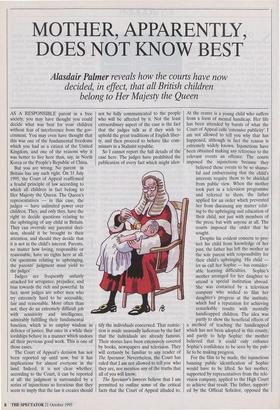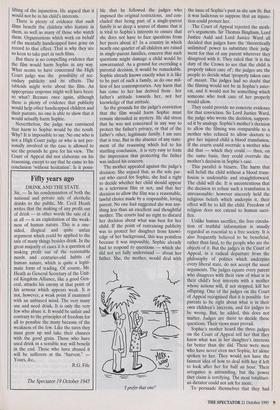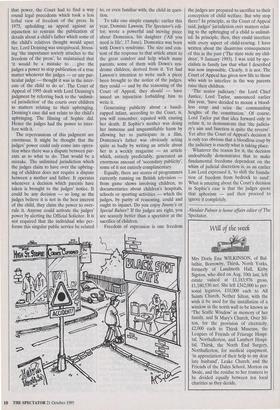MOTHER, APPARENTLY, DOES NOT KNOW BEST
Alasdair Palmer reveals how the courts have now
decided, in effect, that all British children belong to Her Majesty the Queen
AS A RESPONSIBLE parent in a free society, you may have thought you could decide what was best for your children without fear of interference from the gov- ernment. You may even have thought that this was one of the fundamental freedoms which you had as a citizen of the United Kingdom, and one of the reasons why it was better to live here than, say, in North Korea or the People's Republic of China.
But you are wrong. No parent in Britain has any such right. On 31 July 1995, the Court of Appeal reaffirmed a feudal principle of law according to which all children in fact belong to Her Majesty the Queen. The Queen's representatives — in this case, the judges — have unlimited power over children. They, and only they, have the right to decide questions relating to the upbringing of any child in Britain. They can overrule any parental deci- sion, should it be brought to their attention, and should they decide that it is not in the child's interest. Parents, no matter how loving, responsible or reasonable, have no rights here at all. On questions relating to upbringing, the parents' judgment must yield to the judges'.
Judges are frequently unfairly attacked for arrogance, prejudice, and bias towards the rich and powerful. In fact, most judges are sober men who try extremely hard to be accessible, fair and reasonable. More often than not, they do an extremely difficult job with sensitivity and intelligence, admirably fulfilling their fundamental function, which is to employ wisdom in defence of justice. But once in a while their lordships behave in a manner which undoes all their previous good work. This is one of those cases.
The Court of Appeal's decision has not been reported up until now, but it has implications for almost everyone in the land. Indeed, it is not clear whether, according to the Court, it can be reported at all: the judgment is surrounded by a series of injunctions so ferocious that they seem to imply that the law it creates should not be fully communicated to the people who will be affected by it. Not the least extraordinary aspect of the case is the fact that the judges talk as if they wish to uphold the great traditions of English liber- ty, and then proceed to behave like com- missars in a Stalinist republic.
So I cannot report the full details of the case here. The judges have prohibited the publication of every fact which might iden- tify the individuals concerned. That restric- tion is made unusually ludicrous by the fact that the individuals are already famous. Their stories have been extensively covered by books, newspapers and television. They will certainly be familiar to any reader of The Spectator. Nevertheless, the Court has ruled that I am not allowed to tell you who they are, nor mention any of the truths that all of you will know.
. The Spectator's lawyers believe that I am permitted to outline some of the critical facts that the Court of Appeal alluded to. At the centre is a young child who suffers from a form of mental handicap. Her life has been attended by bursts of what the Court of Appeal calls 'extensive publicity'. I am not allowed to tell you why that has happened, although in fact the reason is extremely widely known. Injunctions have been obtained making any reference to the relevant events an offence. The courts imposed the injunctions because they believed those events to be so shame- ful and embarrassing that the child's interests require them to be shielded from public view. When the mother took part in a television programme and referred to them, the father applied for an order which prevented her from discussing any matter relat- ing to the upbringing and education of their child, not just with members of the press, but with anyone at all. The courts imposed the order that he sought.
Despite his evident concern to pro- tect his child from knowledge of her past, the father has left the mother as the sole parent with responsibility for their child's upbringing. His child let us call her Sophie — has consider- able learning difficulties. Sophie's mother arranged for her daughter to attend a special institution abroad. She was contacted by a television company who wished to film her daughter's progress at the institute, which had a reputation for achieving remarkable results with mentally handicapped children. The idea was partly to show the beneficial effects of a method of teaching the handicapped which has not been adopted in this county, and partly to help Sophie: the mother believed that it could only enhance Sophie's confidence to be seen by the pub- lic to be making progress.
For the film to be made, the injunctions banning public identification of Sophie would have to be lifted. So her mother, supported by representatives from the tele- vision company, applied to the High Court to achieve that result. The father, support- ed by the Official Solicitor, opposed the lifting of the injunction. He argued that it would not be in his child's interests.
There is plenty of evidence that such films benefit the children who feature in them, as well as many of those who watch them. Organisations which work on behalf of the mentally handicapped have gone on record to that effect. That is why they are so keen to take part in such films.
But there is no compelling evidence that the film would harm Sophie in any way. What seems to have concerned the High Court judge was the possibility of sec- ondary publicity and its effects. The tabloids might write about the film. An appropriate response might well have been: so what? Because once again, although there is plenty of evidence that publicity would help other handicapped children and their parents, no one is able to show that it would actually harm Sophie.
Nevertheless, the judge was convinced that harm to Sophie would be the result. Why? It is impossible to say. No one who is not a High Court judge or who is not per- sonally involved in the case is allowed to see the grounds he gave for his view. The Court of Appeal did not elaborate on his reasoning, except to say that he came to his conclusion 'without hesitation'. Is it possi- ble that he followed the judges who imposed the original restrictions, and con- cluded that being part of a single-parent family is so deep a source of shame that it is vital to Sophie's interests to ensure that she does not have to face questions from her peers about it? In a country in which nearly one quarter of all children are raised in single-parent families, concern that such questions might damage a child would be unwarranted. As a ground for overriding a parental decision, it would be remarkable. Sophie already knows exactly what it is like to be part of such a family, as do one mil- lion of her contemporaries. Any harm that has come to her has derived from her father's attitude towards her, not her knowledge of that attitude. So the grounds for the judge's conviction that the film would harm Sophie must remain shrouded in mystery. He did stress that he was not concerned in any way to protect the father's privacy, or that of the father's other, legitimate family. I am sure that is true. But in the absence of any state- ment of the reasoning which led to his startling conclusion, it is very easy to form the impression that protecting the father was indeed his concern.
The mother appealed against the judge's decision. She argued that, as the sole par- ent who cared for Sophie, she had a right to decide whether her child should appear in a television film or not, and that her decision to allow the film was a reasonable, lawful choice made by a responsible, loving parent. No one had suggested she was any- thing less than an excellent and thoughtful mother. The courts had no right to discard her decision about what was best for her child. If the point of restraining publicity was to protect her daughter from knowl- edge of her background, this was pointless because it was impossible. Sophie already had to respond to questions — which she did not yet fully understand — about her father. She, the mother, would deal with prefer that one!' the issue of Sophie's past as she saw fit. But it was ludicrous to suppose that an injunc- tion could protect her.
The Court of Appeal rejected the moth- er's arguments, Sir Thomas Bingham, Lord Justice Auld and Lord Justice Ward all decided that judges have the 'theoretically unlimited' power to substitute their judg- ment for that of any parent wherever they disagreed with it. They ruled that 'it is the duty of the Crown to see that the child is properly taken care of the judges are the people to decide what 'properly taken care of meant. The judges had no doubt that the filming would not be in Sophie's inter- est, and it would not be something which someone who took care of her properly would allow.
They could provide no concrete evidence for that conviction. So Lord Justice Ward, the judge who wrote the decision, support- ed it by analogy, Sophie's mother's decision to allow the filming was comparable to a mother who refused to allow doctors to give her injured child a blood transfusion. If the courts could overrule a mother who did that — which they could — then, on the same basis, they could overrule the mother's decision in Sophie's case.
This parallel is bizarre. The harm that will befall the child without a blood trans- fusion is undeniable and straightforward. The child will die. It is uncontentious that the decision to refuse such a transfusion is unreasonable: however sincerely held the religious beliefs which underpin it, their effect will be to kill the child, Freedom of religion does not extend to human sacri- fice.
Unlike human sacrifice, the free circula- tion of truthful information is usually regarded as essential to a free society. It is also frequently believed to be beneficial, rather than fatal, to the people who are the objects of it. But the judges in the Court of Appeal, in a radical departure from the philosophy of politics which underpins every liberal state, do not accept the usual arguments. The judges equate every parent who disagrees with their view of what is in their child's best interests with a mother whose actions will, if not stopped, kill her offspring. One of the judges on the Court of Appeal recognised that it is possible for parents to be right about what is in their own children's interests, and for judges to be wrong. But, he added, this does not matter. Judges are there to decide these questions. Their views must prevail.
Sophie's mother heard the three judges on the Court of Appeal tell her that they knew what was in her daughter's interests far better than she did. These were men who have never even met Sophie, let alone spoken to her. They would not have the faintest idea of how to deal with her if left to look after her for half an hour. Their arrogance is astounding, but the power they claim is terrifying. The most totalitari- an dictator could not ask for more.
To persuade themselves that they had that power, the Court had to find a way round legal precedents which took a less lethal view of freedom of the press. In 1975, upholding an appeal against an injunction to restrain the publication of details about a child's father which some of the child's relatives thought would upset her, Lord Denning was unequivocal. Stress- ing 'the importance society attaches to the freedom of the press', he maintained that `it would be a mistake to . . . give the judges a power to stop publication of a true matter whenever the judges — or any par- ticular judge — thought it was in the inter- ests of the child to do so'. The Court of Appeal of 1995 dealt with Lord Denning's judgment by referring back to the 'unlimit- ed jurisdiction' of the courts over children in matters relating to their upbringing. Denning's case did not relate to the child's upbringing. The filming of Sophie did. Hence the judges had the power to inter- fere with it.
The repercussions of this judgment are enormous. It might be thought that the judges' power could only come into opera- tion when there was a dispute between par- ents as to what to do. That would be a mistake. The unlimited jurisdiction which the judges claim to have over the upbring- ing of children does not require a dispute between a mother and father. It operates whenever a decision which parents have taken is brought to the judges' notice. It could be any decision — so long as the judges believe it is not in the best interest of the child, they claim the power to over- rule it. Anyone could activate the judges' power by alerting the Official Solicitor. It is not required that the individual who per- forms this singular public service be related to, or even familiar with, the child in ques- tion.
To take one simple example: earlier this year, Dominic Lawson, The Spectator's edi- tor, wrote a powerful and moving piece about Domenica, his daughter (`All you need is life', 17 June). Domenica was born with Down's syndrome. The size and con- tent of the response to that article attest to the great comfort and help which many parents, some of them with Down's syn- drome children, derived from it. Yet had Lawson's intention to write such a piece been brought to the notice of the judges, they could — and by the reasoning of the Court of Appeal, they should — have issued an injunction forbidding him to write it.
Generating publicity about a handi- capped infant, according to the Court, is, you will remember, equated with causing her death. if Sophie's mother was doing her immense and unquantifiable harm by allowing her to participate in a film, Domenica's father was obviously acting quite as badly by writing an article about her in a weekly magazine — an article which, entirely predictably, generated an enormous amount of 'secondary publicity', some of it not entirely complimentary. Equally, there are scores of programmes currently running on British television from game shows involving children, to documentaries about children's hospitals, schools or sporting activities — which the judges, by parity of reasoning, could and ought to injunct. Do you enjoy Jimmy's or Special Babies? If the judges are right, you are scarcely better than a spectator at the sacrifice of children.
Freedom of expression is one freedom the judges are prepared to sacrifice to their conception of child welfare. But why stop there? In principle, as the Court of Appeal said, judges' jurisdiction over matters relat- ing to the upbringing of a child is unlimit- ed. In principle, then, they could interfere with every aspect of child-rearing. I have written about the disastrous consequences of this in the past (`The state stole my chil- dren', 9 January 1993). I was told by spe- cialists in family law that what I described was now impossible. Clearly, it is not. The Court of Appeal has given new life to those who wish to interfere in the way parents raise their children.
`The senior judiciary,' the Lord Chief Justice, Lord Taylor, announced earlier this year, 'have decided to mount a blood- less coup and seize the commanding heights of the constitution.' Of course, Lord Taylor put that idea forward only to refute it, to demonstrate that 'the judicia- ry's aim and function is quite the reverse'. Yet after the Court of Appeal's decision it is only too obvious that a bloodless coup by the judiciary is exactly what is taking place. Whatever the reason for it, the decision undoubtedly demonstrates that to make fundamental freedoms dependent on the whim of judicial discretion is, as an earlier Law Lord expressed it, `to shift the founda- tion of freedom from bedrock to sand'. What is amazing about the Court's decision in Sophie's case is that the judges quote that aphorism — and then proceed to ignore it completely.
Alasdair Palmer is home affairs editor of The Spectator.












































































 Previous page
Previous page